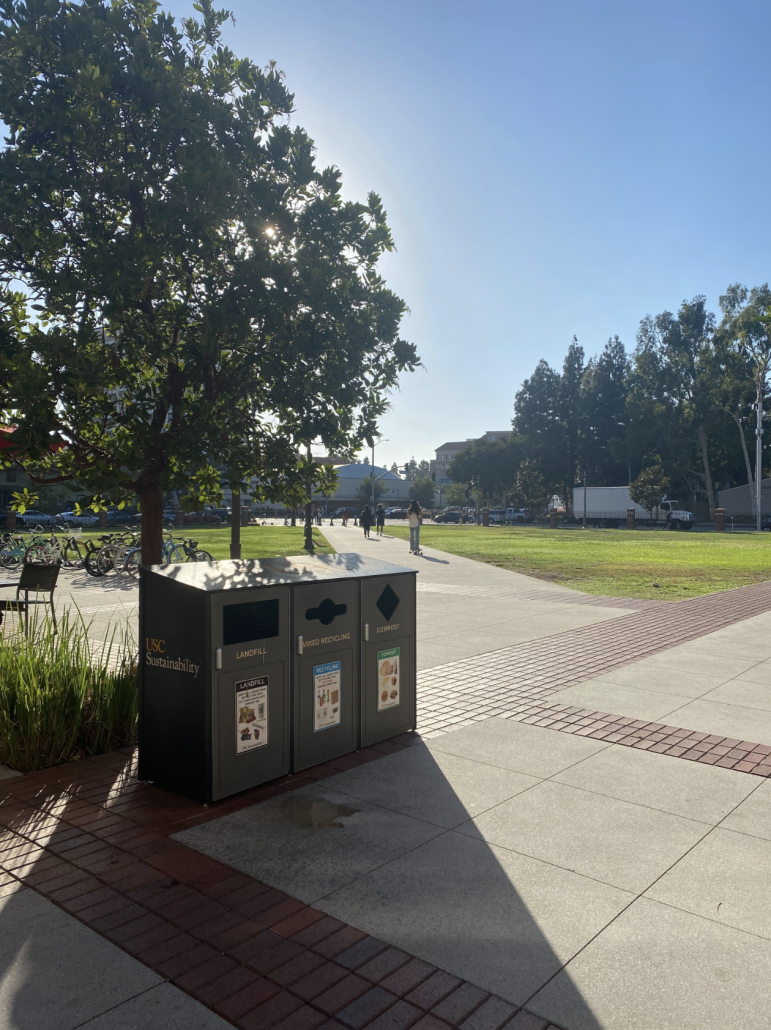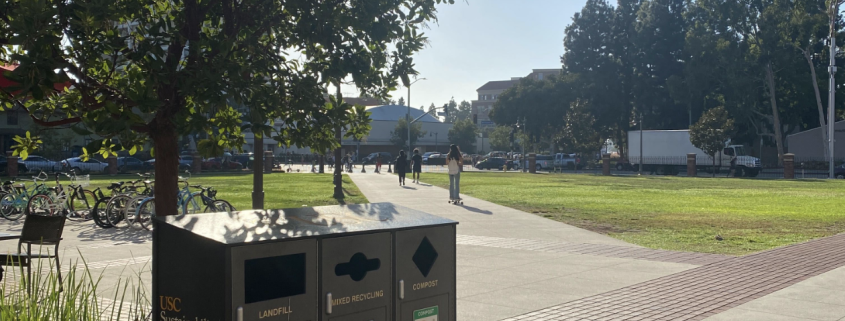University grant advances sustainability innovation

The University announced Monday that they received an $8.8 million grant that will support sustainability research initiatives. The grant — composed of settlement funds from a 2016 class-action lawsuit — will support the USC Urban Trees Initiative, USC Energy Institute and the USC Dornsife Microbial Greenhouse Gas Consumption Research Center.
USC is one of over two dozen institutions receiving funding from the class-action lawsuit and the projects will advance the University’s sustainability measures.
The USC Urban Trees Initiative is a program intended to build healthy, climate-resilient neighborhoods through the development of an urban forest in Los Angeles. University experts and the City of Los Angeles are leading the initiative with the goal of overcoming environmental inequalities throughout the community.
Marianna Babboni is a project manager for the USC Dornsife Public Exchange, which develops social impact projects — including the USC Urban Trees Initiative — between the University and outside organizations. Babboni explained the importance of trees to the health and safety of those living in an urban city.
“Trees are a cost-effective solution to reducing temperatures, improving air quality and providing safe recreational spaces for Angelenos,” Babboni said.
Babboni also addressed temperatures in L.A. which she said are rising at an accelerated rate and pose a threat for transportation throughout the city. Hot days can cause the pavement to reach temperatures of 140 degrees, which releases harmful pollutants in the air, according to Yale University and Carnegie Mellon University researchers.
“It’s dangerous for walking conditions, for young and elderly populations to pursue recreational activities,” Babboni said.
The grant will assist the initiative in determining where trees should be planted throughout L.A., based on need and benefit. It will also aid in research to test tree performance and resiliency. The University will allocate funding to plant and maintain approximately 400 trees for three years.
Since its fruition in 2020, the initiative has thrived through the help of students.
“USC students have been absolutely critical to this work,” Babboni said, adding that she hopes many other students become involved with the initiative during the three-year span of the grant.
The USC Energy Institute is a USC Viterbi School of Engineering center that hopes to promote the development of faculty research programs concerning energy-related innovations.
California’s energy needs have grown and renewable energy sources such as wind and solar power have little room for energy storage, said Donald Paul, executive director of the USC Energy Institute and a research professor of engineering at the Viterbi School of Engineering. To combat these growing energy needs, Paul said the institute is conducting research to develop methods to store large amounts of energy in idle wells through the subsurface.
Paul provides business development, support and mentorship for faculty and students regarding energy transition to develop a low-carbon future. Paul said there are many abandoned wells throughout Southern California in residential and commercial areas.
“What is unique [to] really anywhere in the world, is we have all of this infrastructure now in the middle of this 10 million person metropolitan area,” Paul said.
According to the California Department of Conservation, if left unsealed, these abandoned wells can be harmful to groundwater and public safety.
Paul, in collaboration with Viterbi professor Iraj Ershaghi, will begin conducting field experiments in the San Joaquin Valley beginning Spring 2023.
Jan Amend, professor of earth sciences and biological sciences and divisional dean of the life sciences at USC Dornsife College of Letters, Arts and Sciences, leads the USC Dornsife Microbial Greenhouse Gas Consumption Research Center.
The new center will research microorganisms and their ability to transfer greenhouse gasses — such as carbon dioxide, methane and nitrous oxide — into non-harmful waste.
“Understanding and harnessing this microbial power will lead to novel solutions in the fight to mitigate climate change,” Amend told USC News Monday.
In light of the Office of Sustainability’s recent “Assignment: Earth” framework campaigns — including Green Week and Earth Week — students have noticed a difference in the University’s sustainability efforts under President Carol Folt compared to previous administrations.
Alisha Soni, a junior majoring in environmental studies and non-governmental organizations and social change, is a sustainability supply chain research and analysis intern with the Office of Sustainability.
“Compared to the previous administration, this administration led by President Folt has put sustainability initiatives at the forefront of their agenda,” Soni said.
Soni assists with the calculation of the University’s carbon footprint as a result of food distribution, then uses the data to develop ways the University can reduce its carbon footprint. Soni hopes to connect people to resources they don’t have access to and ensure the wellbeing of the environment and the people who live on the planet.
“I think that over the last few years, the science behind environmental issues — whether that be climate change, food insecurity, land degradation or renewable energy — has kind of taken more of a forefront role in peoples’ jobs and in peoples’ minds,” Soni said.
Soni believes sustainability research is discovering methods to incorporate sustainability into our everyday lives, but also applying a sustainable approach to our ecosystem.
“There’s a lot of environmental issues that are really pressing in L.A., especially in the South Central community, in terms of pollution and food deserts,” Soni said. “Research in those areas will be beneficial to directly address the needs of community members.”
Natalie Black, a fourth-year student studying dentistry, is president of the Ostrow Sustainability Group, a student organization committed to implementing sustainable practices into the dentistry and medical communities.
Black, who completed her undergraduate education at the University in 2019, said sustainability was not a priority during the previous University administration.
“We truly need to be working together to practice [and] live more sustainably to better protect our planet and our future and our kids’ future,” Black said.
Black also said sustainability research is important because there is so much that needs to be added to the field — such as how we can live and work more sustainably. With a scientific background, Black said she believes research is the backbone of sustainable innovation.
“The fact that we got this funding is awesome,” Black said. “I feel like in undergrad, I would not [have expected] this to happen.”
President Folt spoke about the University’s commitment to sustainability efforts during the University Park Campus State of the University address in April. In her statement, Folt explained her concern for environmental solutions.
“We are turning our concern into action, starting right here at home,” Folt said. “As an environmental scientist — I know how interconnected our environment is, and that we must take a comprehensive and integrated approach if we are going to find lasting, scalable solutions.”

